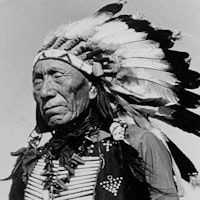The Eye of my heart sees everything; and through this vision I can help my people.
Black Elk [Heȟáka Sápa]

The Eye of the Great Spirit
Topic: Wisdom & Understanding
I am blind and do not see the things of this world; but when the light comes from above, it enlightens my heart and I can see, for the Eye of my heart sees everything; and through this vision I can help my people. The heart is a sanctuary at the center of which there is a little space, wherein the Great Spirit dwells, and this is the Eye. This is the Eye of the Great Spirit by which He sees all things, and through which we see Him. If the heart is not pure, the Great Spirit cannot be seen…
Heȟáka Sápa, commonly known as Black Elk, was born in December 1863 along the Little Powder River in what is now Wyoming. He was a member of the Oglala Lakota (Sioux) and a second cousin to the renowned war leader Crazy Horse. From a young age, Black Elk experienced profound spiritual visions that would shape his life and destiny. At the age of nine, during a severe illness, he had a vision in which he encountered the Six Grandfathers, spiritual beings who bestowed upon him gifts and powers, including the ability to heal. This vision set him on the path to becoming a wičháša wakȟáŋ, or holy man, a role he embraced throughout his life.
Black Elk's life was marked by significant historical events and personal transformations. He participated in the Battle of the Little Bighorn in 1876 and witnessed the tragic Wounded Knee Massacre in 1890. In the late 1880s, he traveled to Europe with Buffalo Bill's Wild West Show, where he sought to understand the ways of the white people. Upon returning to the United States, he became involved in the Ghost Dance movement, which aimed to restore the Native American way of life. Despite the suppression of this movement, Black Elk continued to serve his people as a healer and spiritual leader, blending traditional Lakota practices with his later conversion to Catholicism in 1904. He became a catechist, teaching Christianity while maintaining his Lakota spiritual beliefs.
Black Elk's legacy extends beyond his lifetime through his contributions to literature and spiritual teachings. His autobiographical accounts, shared with poet John G. Neihardt and anthropologist Joseph Epes Brown, were published in the influential works "Black Elk Speaks" and "The Sacred Pipe." These books have inspired generations and contributed to the revival of Native American culture and spirituality. Black Elk's ability to integrate his Lakota heritage with his Christian faith exemplifies his resilience and adaptability. His life and teachings continue to resonate, symbolizing a bridge between cultures and a testament to the enduring spirit of the Lakota people.
Wilson, Andrew, editor. World Scripture II. Universal Peace Federation, 2011, p. 329 [Black Elk (Heȟáka Sápa)].

Black Elk [Heȟáka Sápa]
Theme: Wisdom

Black Elk
Black Elk [Heháka Sápa] (1863-1950) was a famous wičháša wakháŋ (medicine man and holy man) and heyoka of the Oglala Lakota (Sioux) who lived in the present-day United States, primarily South Dakota. He was a second cousin of the war chief Crazy Horse.
Joseph Epes Brown: Black Elk [An augmented version of the above-quoted passage]
“I am blind and do not see the things of this world; but when the Light comes from Above, it enlightens my heart and I can see, for the Eye of my heart (Chante Ista) sees everything; and through this vision I can help my people. The heart is a sanctuary at the center of which there is a little space, wherein the Great Spirit (Wakan-Tanka) dwells, and this is the Eye (Ista). This is the Eye of the Great Spirit by which He sees all things, and through which we see Him. If the heart is not pure, the Great Spirit cannot be seen, and if you should die in this ignorance, your soul shall not return immediately to Wakan-Tanka, but it must be purified by wandering about in the world. In order to know the center of the heart in which is the Mind of Wakan-Tanka, you must be pure and good, and live in the manner that Wakan-Tanka has taught us. The man who is thus pure contains the Universe within the Pocket of his heart (Chante Ognaka).”
–Black Elk [Frithjof Schuon, “The Sacred Pipe,” in The Feathered Sun: Plains Indians in Art and Philosophy (Bloomington, IN: World Wisdom Books, 1990)] p. 51, and [The Spiritual Legacy of the American Indian: Unpublished Letters of Joseph Epes Brown] p. 106.
Additional Black Elk Quotes
Resources
Related Quotes
Copyright © 2017 – 2026 LuminaryQuotes.com About Us